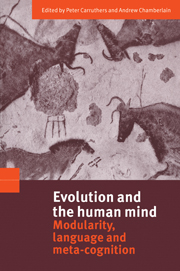Book contents
- Frontmatter
- Contents
- List of contributors
- Preface
- 1 Introduction
- 2 Massively modular minds: evolutionary psychology and cognitive architecture
- 3 Individual differences in early understanding of mind: genes, non-shared environment and modularity
- 4 Darwin in the madhouse: evolutionary psychology and the classification of mental disorders
- 5 Evolution of the modern mind and the origins of culture: religious concepts as a limiting-case
- 6 Symmetry and the evolution of the modular linguistic mind
- 7 Evolution, communication and the proper function of language
- 8 The evolution of knowledge
- 9 Mind, brain and material culture: an archaeological perspective
- 10 The evolution of strategic thinking
- 11 On the origin of the human mind
- 12 The evolution of consciousness
- 13 Evolution, consciousness and the internality of the mind
- References
- Author index
- Subject index
5 - Evolution of the modern mind and the origins of culture: religious concepts as a limiting-case
Published online by Cambridge University Press: 18 December 2009
- Frontmatter
- Contents
- List of contributors
- Preface
- 1 Introduction
- 2 Massively modular minds: evolutionary psychology and cognitive architecture
- 3 Individual differences in early understanding of mind: genes, non-shared environment and modularity
- 4 Darwin in the madhouse: evolutionary psychology and the classification of mental disorders
- 5 Evolution of the modern mind and the origins of culture: religious concepts as a limiting-case
- 6 Symmetry and the evolution of the modular linguistic mind
- 7 Evolution, communication and the proper function of language
- 8 The evolution of knowledge
- 9 Mind, brain and material culture: an archaeological perspective
- 10 The evolution of strategic thinking
- 11 On the origin of the human mind
- 12 The evolution of consciousness
- 13 Evolution, consciousness and the internality of the mind
- References
- Author index
- Subject index
Summary
The human cultural explosion is often explained in terms of ‘liberating events’, or of a newly acquired flexibility in mental representations. This chapter considers a domain where such flexibility should be maximal, that of religious representations, and shows that actual cultural transmission is in fact constrained by evolved properties of ontological categories and principles. More generally, this suggests that the ‘cultural mind’ typical of recent human evolution is not so much an unconstrained mind as a mind equipped with a host of complex, specialised capacities that make certain kinds of mental representations likely to succeed in cultural transmission.
Introduction
The hallmark of the modern human mind is that it is a cultural mind. Humans receive vast amounts of information from cultural elders and peers. They use that information to build conceptual structures, some aspects of which are group-specific and form the basis of what we usually call ‘cultures’. What made the modern mind cultural? There are two complementary issues here. One is to describe the evolutionary emergence of cognitive capacities that made (and make) culture possible. Another is to examine how these evolved capacities have a constraining effect on actual human cultures; that is, how they make some cultural trends, and some types of cultural representations, more likely than others to appear in human groups.
In this chapter I suggest that the question of cultural evolution is all too often approached from the first angle only.
- Type
- Chapter
- Information
- Evolution and the Human MindModularity, Language and Meta-Cognition, pp. 93 - 112Publisher: Cambridge University PressPrint publication year: 2000
- 12
- Cited by



